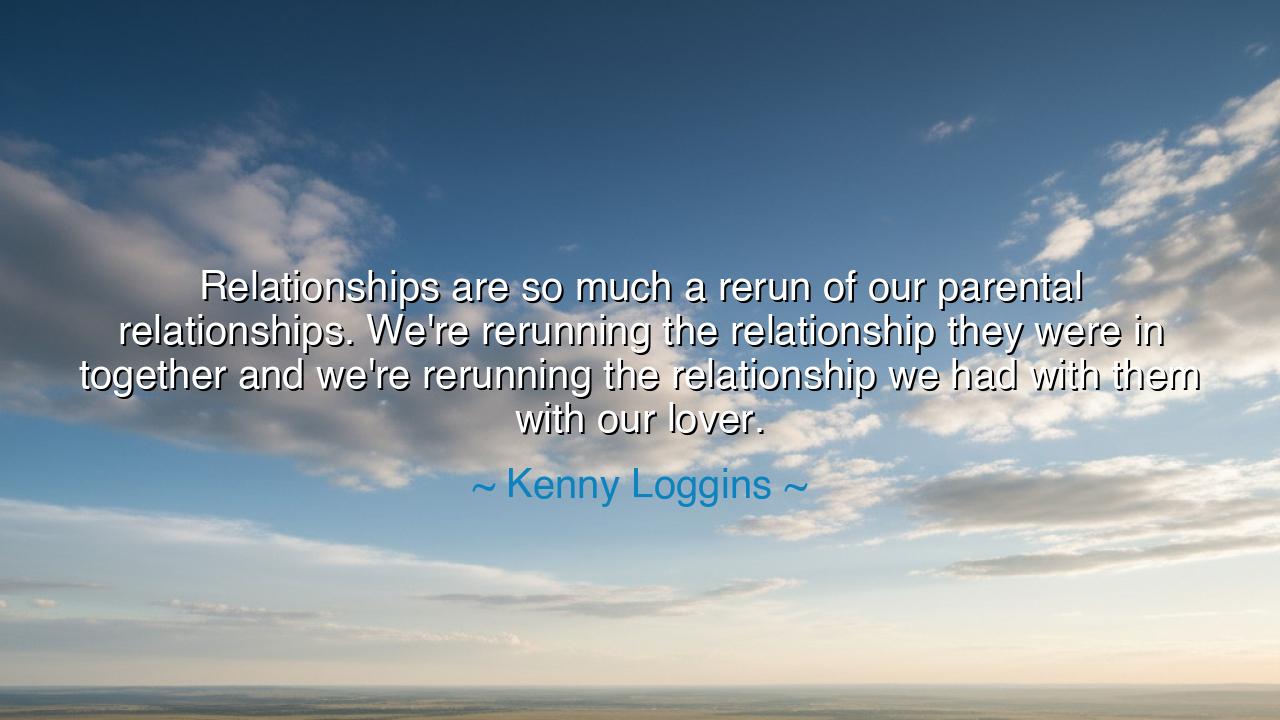
Relationships are so much a rerun of our parental relationships.
Relationships are so much a rerun of our parental relationships. We're rerunning the relationship they were in together and we're rerunning the relationship we had with them with our lover.






In the sacred theater of love, the patterns of the past often replay themselves upon the stage of the present. Kenny Loggins speaks to this timeless truth when he declares, “Relationships are so much a rerun of our parental relationships. We’re rerunning the relationship they were in together and we’re rerunning the relationship we had with them with our lover.” These words reveal the invisible threads that bind generations, showing how the bonds we first know in the home shape the connections we seek and maintain in adulthood.
To rerun the dynamics of parental bonds is to carry forward the echoes of formative love and conflict. Loggins’ insight teaches that the way we interact with our lover often mirrors the behaviors, expectations, and unresolved tensions witnessed between our parents. The ancients understood this principle intuitively: the child is a reflection of the household, and the patterns of the home travel silently through time, shaping hearts and relationships long after childhood ends.
Yet recognition of this rerun is the first step toward freedom. By seeing how the past colors our present, we gain the power to act with consciousness rather than compulsion. Loggins reminds us that the cycle need not be unbroken. To love wisely is to discern which inherited patterns serve the flourishing of connection and which demand transformation, allowing the present relationship to stand on its own merit rather than being bound by echoes of the past.
The origin of this wisdom is ancient, traced through the teachings of philosophers, sages, and storytellers who observed the enduring influence of family upon character and choice. From Aristotle’s reflections on household virtue to the Eastern masters who saw the child as a mirror of the lineage, humanity has long recognized that the home is the first crucible of relational patterns. Loggins’ words carry this understanding into modern insight, revealing that self-awareness is the key to breaking cycles and cultivating love that is conscious and freeing.
Thus, let this teaching endure: honor the lessons of your parental relationships, yet do not become a prisoner of their reruns. Observe how past bonds echo in your relationships and act with wisdom, discernment, and intention. In this mindful engagement, love becomes a living art, shaped not by repetition alone but by the conscious cultivation of empathy, respect, and freedom for both yourself and your lover.






TBTRAN THANH BINH
This quote from Kenny Loggins is both insightful and a little unsettling. It implies that we’re not just choosing relationships based on compatibility, but also because they resemble the dynamics we grew up with. Do you think it’s possible to recognize these patterns early and change them? Or do we often fall into these familiar roles without even realizing it, because they’re so deeply ingrained from childhood?
HDHan Do
I find Kenny Loggins’ perspective on relationships thought-provoking, especially about how we repeat our parents’ dynamics with our partners. It makes me wonder: Do we need to consciously recognize these patterns to stop repeating them? Or is it just an inevitable part of human nature? How much of our relationship patterns are shaped by our upbringing, and how much can be actively changed over time?
QPQuynh pham
This quote resonates with me because it highlights the psychological influence of our parents on our adult relationships. But it also raises a question—can we truly escape those patterns, or are we bound to repeat them without even realizing it? Do you think it's possible for someone to have a healthy relationship without any of those subconscious influences coming into play?
PNphuong nhu
Kenny Loggins' quote really made me think about how much our childhood relationships shape how we interact in our adult relationships. It’s fascinating to think that we might unknowingly recreate patterns from our parents’ relationship or the dynamic we had with them. How do you think people can break free from these patterns if they’re not serving them? Is it something that requires deep self-awareness or therapy?